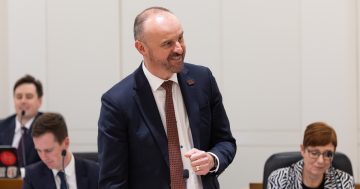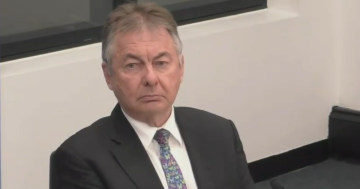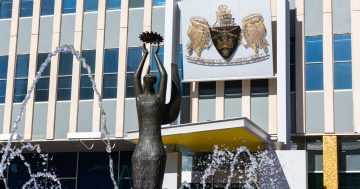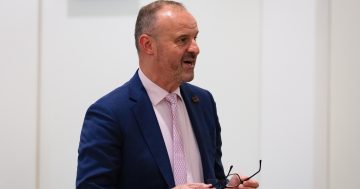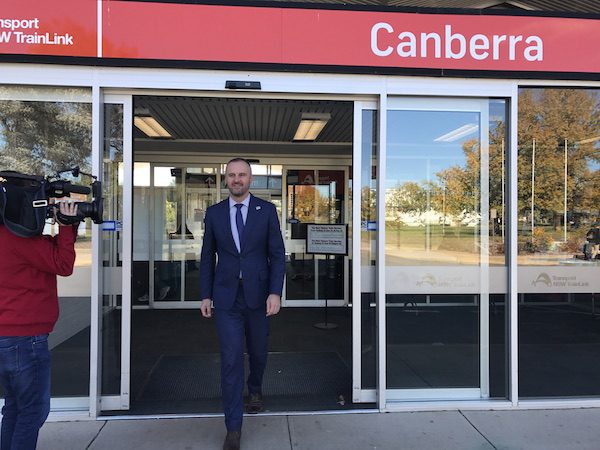
Andrew Barr at Canberra Station. He expects the media to get on board. Photo: File photo.
Was it just a brain snap from the Chief Minister? An expression of his increasing frustration with some sections of the Canberra community to accept his vision for the national capital?
Or was he just grabbing the attention of his audience with an ‘outrageous’ opening gambit?
Andrew Barr is an accomplished communicator, deliberate and strategic in all that he does. He would have known, given his communications professionals audience, that his now notorious ‘I hate journalists’ comments and loathing of The Canberra Times in particular, would have been leaked immediately.
The Chief Minister not only put more than a few shots across the bows of mainstream media, but flagged an intensified effort by his Government to connect with Canberrans directly without going through the ‘negative’ filter of journalists. He challenged his audience, as he said he had done with his own media staff, to be innovative and come up with exciting new ways to go over the heads of journalists to a public presumably eager to get the real news.
I don’t want to mention names but doesn’t this sound familiar?
Andrew Barr is obviously proud of the fact that he has gone to two elections with big issues such as tax reform and light rail, and won. In his mind, Canberrans have given him a mandate to get on with the job and any complaints from the usual suspects, including journalists, is just so much carping.
He has a point. How long must the light rail debate go on? How long must densification be challenged? How long must the Government’s long-term tax reform process, accepted by most economists as fair, efficient and equitable, be questioned?
Mr Barr’s Government is providing the infrastructure and services that Canberrans need and want. He may well view the ongoing criticism through the prism of the memorable scene from The Life of Brian where the revolutionaries ask the rhetorical question, “What have the Romans ever done for us?”
The answer was quite a lot actually.
In Mr Barr’s mind he doesn’t deserve the negative depiction or reception he receives from mainstream media and in a changed media landscape, the means are now there to take his case directly to the people.
According to Assistant Professor in journalism at the University of Canberra, Dr Caroline Fisher, he has every right to do that and should be doing it but his attack on journalists was intemperate, foolish and showed a lack of respect for journalism’s democratic role.
“He may regret that because if he doesn’t like the coverage that he is getting at the moment, I can’t imagine that it’s going to become more positive or less critical,” Fisher said.
She said the Chief Minister would be a fool not to take advantage of the new communications platforms but mainstream media was still part of the suite of communication tools.
Calling it a flashpoint in the relationship between the Canberra news media and the Government, Fisher hoped Mr Barr’s speech galvanised media companies to increase resources to boost coverage of the Legislative Assembly and social issues generally in Canberra.
She said the media and the Chief Minister needed to find a way forward where they could treat each other with mutual respect.
A statement from Mr Barr and his ministers, saying they respected the role journalists play and weren’t seeking to subvert that, may go some way to mending fences.
But they also said where there was “concentrated media ownership, such as in Canberra, it is beholden on media outlets to accurately and fairly report, without prosecuting their own agendas”.
Dr Fisher also described Mr Barr as being a bit precious. One can only imagine how the Chief Minister would handle a Daily Telegraph in this town.
While some may prefer to get their news and information straight from the horse’s mouth, Governments and bureaucracies are not in the business of being willingly open and transparent. Despite Freedom of Information legislation and commitments to community engagement, they tend to obscure real intentions, hide mistakes and omit unfavourable facts.
Agencies set up virtually impenetrable walls to public access – there is even an Access Canberra that can be anything but. One only has to look at Centrelink, the federal Department of Human Services or Immigration/Border Force. Police now retain such a grip on information, ostensibly for operational reasons, that obtaining even the most basic information about a road accident or for example the recent fatal Bonner house fire is like getting blood out of a stone. Sometimes I am almost waiting to hear that insidious phrase ‘on-water matters’.
In a free and democratic society, one that has enabled Andrew Barr to become Chief Minister, the role of journalists, imperfect as the rest of us, to uncover the truth and shine a light on the unpalatable is crucial. Their job is not to climb on board the Government bus, or light rail vehicle for that matter.
To suggest they are the preserve of print, a dying medium, is mischievous. As I said when I left the Canberra Times in 2012, the platform may change but the work we do doesn’t. The Chief Minister and those like him, hopefully, are always going to bump up against journalists asking the difficult questions no matter what the tools are.
And for all Andrew Barr’s embrace of things digital, his response to a standing invitation at The RiotACT, definitely a ‘new media’ company, to present his case direct to our readers has been lukewarm.
The RiotACT welcomes as many people as possible to the great conversation about where we live and work but we also reserve the right to advocate for the community, question those in authority and hold them to account.
The Chief Minister has an undeniable passion and vision for this city and the region, but he is not the Messiah, and in relation to how he treats the media, just a very naughty boy.












